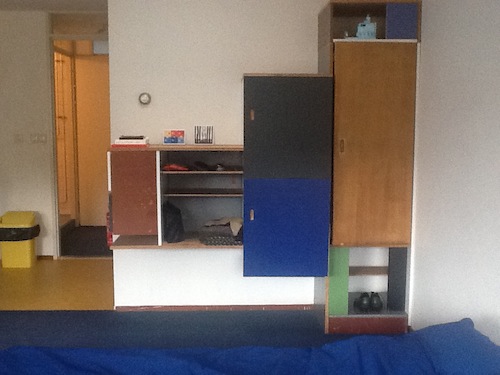
I’m still reading Thomas Bernhard. Now I read in an attic room in Rotterdam, bright and clear and sparse, with midnight blue carpet. There’s a skylight and three tall windows. It’s my observatory; I’m in Hoeller’s garret, transplanted. I write to my friend Pascal Poyet about reading a passage about the main character’s insomnia, as I myself am up late with my own insomnia, no doubt from all the recent train travel and changes of places and rooms. I tell him the insomniac character was watching from his garret window as his host worked very late, below in his atelier; he could be observed in a pool of lamplight through the atelier’s unshuttered window. His work was taxidermy. He was observed bent over for hours in the night, stuffing vast quantities of polystyrene into the corpse of a huge black bird, disappearing from time to time to retrieve more polystyrene. There are days when writing feels like this I say. The insomniac watchman finally turned out his light at 2 am and so do I.
My huge black bird is called adverb, Pascal answers the next day. I’d like any word to become or be able to become an adverb of a sort, he says, he’s been thinking about it for a long time. I know that in his work, especially in Un sens facétieux, which I am slowly translating, calling it A Physical Comedy, words are examined as if they were characters on a proscenium. Sometimes they exchange roles; the dry humour and precision of his linguistic comedy is exquisite. So when I pick up Corrections again, in the bright morning, and begin to read, I’m looking for adverbs. It’s a weird way to read; would it be different if I were looking for adjectives? It does seem like all words are, or are about to be, adverbs. The preposition really does become an adverb. I have a cognitive swimming sensation; I’m floating through this prose, though not as a born swimmer, as some are. So randomly, but in a thorough way, on the pages I am now reading, Roithamers’s reflections on his obsessive project, the construction of an architectural cone deep in the forest, a form built as the expression of the convergence of his sister’s inner and outer lives, and indeed with the intention to finally house his sister, who fatefully (fatefully) knows nothing yet about the hidden cone: only, finally, only, immediately, naturally, objectively, naturally, only, emotionally, intellectually, thoroughly, solidly, constantly, ultimately, constantly, invariably, clearly and forcefully, naturally, entirely, personally, actually, instinctively, actually, properly, conversely, increasingly, basically, thoroughly.
I get up from my reading, bend over, and proceed to pick up all of the long white hairs that have fallen on the dark carpet.
Poet Lisa Robertson is known for working in book-length projects. Her subject matter includes political…
Read Full Biography

